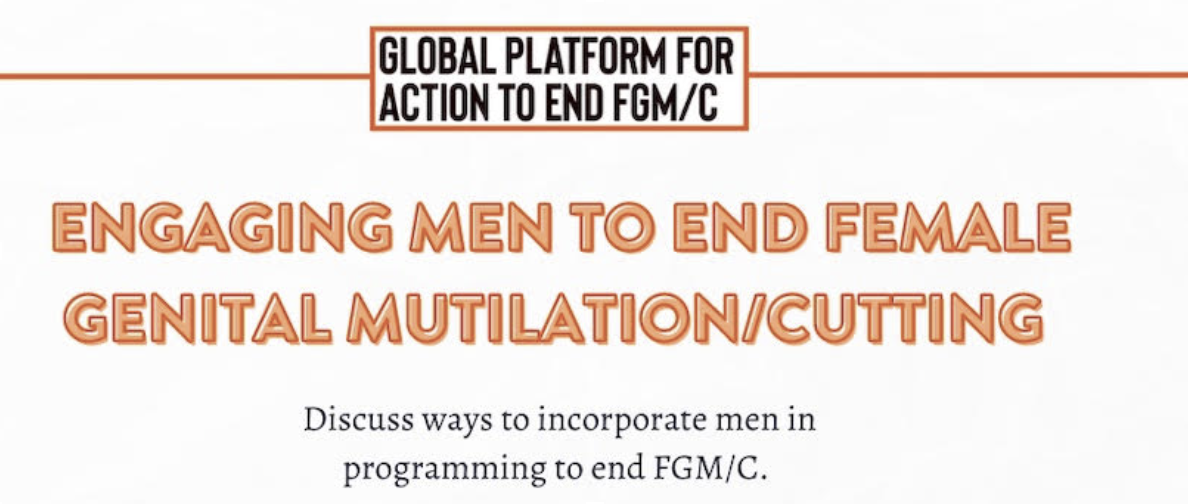The Global Platform for Action to End FGM/C’s virtual parallel event at the Commission on the Status of Women showcased the importance of engaging boys and men in ending female genital mutilation/cutting (FGM/C). This event united esteemed speakers and participants from various organisations around the globe who share a common goal to end FGM/C. The panel gathered advocates and experts including Fatima Sy, Dame Indiaye, Mariya Taher, Mireille Tushiminina, Rodrigue Nkwayaya and Catherine Cox. This event was moderated by Carol Jenkins.
‘Imagine if every man said they would not marry your daughter if she underwent FGM’ ~ Mireille Tushimina
Mireille Tushimina’s powerful preface set the mood for the event. Mireille highlighted that men need to have active roles in ending FGM/C. They can do this by voicing their opposition to the practice and by working with traditional and religious leaders, who often play a crucial role in the development of social norms.
‘We have everything we need to reach zero tolerance for violence against women. There are no more excuses’. ~ Dr Morris, as quoted by Mireille.
The event recognised that we are in a decade of action. However, our progress needs to be 10x faster than it is now to end FGM/C by 2030. Therefore we need men and boys on board as activists, researchers, policymakers and in academia.
Sahiyo Co-Founder Mariya Taher and Programs Coordinator Cate Cox showcased Sahiyo’s Bhaiyo program, which launched in 2021. They discussed how FGM/C, a deep-rooted social norm, is not a practice that will change overnight. This is why it is crucial to spark discussion. This video demonstrated male support for ending FGM/C, and how men can act as ambassadors. Sahiyo’s Bhaiyo program includes male voices in this discussion, ensuring that men are aware of and feel the capacity to fulfil their duty to ensure the protection of women’s rights.
A short clip from Giselle Portenier’s award-winning documentary ‘In the name of your daughter’ was shown. This clip featured men in a Tanzanian market talking about why they feel the need for girls to be subjected to FGM/C. The clip dispelled prevailing social norms surrounding FGM/C and the misconceptions around why girls are cut. The myths mentioned in the clip made me realise that this issue is not going to decrease on its own - these myths and the silence surrounding them are the very reason FGM/C persists.
‘Men as influencers’ ~ Rodrigue Nkwayaya
End FGM EU Ambassador and Champion of Change, Rodrigue Nkwayaya, took a firm stance that men have influence over their communities. Alfred’s video exhibited how male allies can exert this influence. Some men choose to cut their daughters as this behaviour is in line with social expectations. For some communities, ending FGM/C is viewed as destroying culture and doing away with identity.
‘This is a community issue’ ~ Mariya Taher
Fatima Sy, executive secretary of the Senegalese Association for the Future of Women and Children (ASAFE) and recently elected deputy mayor of the city of Guédiawaye, discussed the stigmatisation women face if they do not undergo FGM/C. She remarked that women are alienated if they are not cut and that they are obligated to accept the practice because it forms part of a cultural tradition.
Rodrigue built on this discussion by stating that this is why the position of men is important. Men can say no, and they can help women say no. It is important to understand that this practice is a violation of human rights and that women should not be subordinated in this way. The main point I took away from the event was the need to transform gender relations in systems that maintain FGM/C. For FGM/C to end we need to dismantle patriarchal systems and shift cultural paradigms. FGM/C is about power and control and as Rodrigue Nkwayaya put it, ‘someone who controls you in private can control you in public’. Dame Ndiaye pointed out that this is no easy task and bringing men together in a forum does pose some challenges, but progress is possible and activism efforts are striving towards making that change.
What do we need to do to make that 2030 deadline?
Dame Ndiaye, co-founder of the National Youth Alliance for Reproductive Health and Family Planning in Senegal, stressed the need for a multi-sectoral approach in ending FGM/C and that this approach should include everyone, at all levels.
I consider this event to be a very important contribution to the conversation on FGM/C that filled attendees with hope that change is coming. It was clear to me that this change calls for the participation and investment of all genders. Men must challenge this form of discrimination as the practice of FGM/C affects them too.We all must speak up, educate ourselves and have conversations with one another.
The exchange concluded with a moving and powerful global snapshot video of quotes from around the world. I found this video very useful as a recap of the event discussion as it highlighted the crucial role men play in ending FGM/C.
A recording of this event can be found here.

